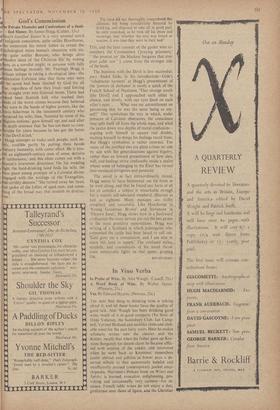God's Commission
c Private Memoirs and Confessions of a Justi- ' • Bed Sinner. By James Hogg: (Calder, 13s.) OGG's Justified Sinner is a very unusual novel religious conscience, quite unlike Hawthorne, o constructs his moral fables to reveal the ychological states beneath obsession with sin, d quite unlike Bunyan, who brings alive hodox ideas of 'the Christian life' by vesting m, as a novelist might, in persona: with fully Ian feelings (notably Mr. Fearing). Hogg is rhaps unique in taking a theological idea-the atinomian Calvinist idea that those who were be saved had been 'elected' by God for all me, regardless of how they lived—and forcing his straight over into fictional terms. There had licked been Scottish folk who washed their ands of the worst crimes because they believed hey were in the hands of higher powers, like the ewis fisherman in the nineteenth century who I ordered his wife; then, 'haunted by some of his g ligious notions,' gave himself up;. and said after
death sentence that 'he has not been so coin- ) kirtable for years because he has got the better f the Devil at last.'
Hogg attempts to make such people, such be- lefs, credible partly by putting them beside rdinary humanity, with comic effect. He is him- elf an eighteenth-century man of sense, derisive f 'enthusiasm,' and this often comes out with a easant's irreverent directness. On his wedding ight the hard-drinking laird finds his wife, the inco pious young protegee of a Calvinist divine engaged with the writings of the Evangelists, ad terribly demure.' She turned away her head, lid spoke of the follies of aged men, and some- hing of the broad way that .leadcth to destruc- Ion.'
The laird did not thoroughly comprehend this allusion; but being considerably flustered by 'drinking, and disposed to take all in good part, he only remarked, as he took off his shoes and stockings, that 'whether the way was broad or narrow, it was time they were in their bed.'
This, and the later comedy of the gaoler who re- members the Covenanters ('praying prisoners,' "'the poorest an' the blackest bargains that ever poor jailer saw" '), come from the stronger side of the book.
The business with the Devil is less successful, pace Andre Gide, in his introduction—Gide's 'voluptuous torment' at Hogg's presentment of the 'powers of darkness' is surely a quirk of the French School of Nastiness. 'That strange youth [the Devil] and I approached each other in silence, and slowly, with our eyes fixed on each other's eyes. . . . What was my astonishment on perceiving that he was the same being as my- self!' This symbolises the way in which, under pressure of Calvinist obsessions, the conscience may split itself off from the whole man, and wind the zealot down into depths of moral confusion— arguing with himself to square real doubts, inciting himself to things his feelings recoil from. But Hogg's symbolism is rather external. Too many of the justified sins are plain crimes set side by side with flat generalisations against bigotry, rather than an inward presentment of how idea, will, and feelings strive confusedly inside a zealot whose sense of belonging to the Elect has turned into maniacal arrogance and paranoia.
The novel is in fact extraordinarily mixed. Hogg seems to have hammered out his form as he went along, and that he found any form at all for so complex a subject is remarkable enough for a mainly self-educated shepherd, illiterate as late as eighteen. Many . passages are richly imagined, and successful. Like Hawthorne in 'Young Goodman Brown'. and. Stevenson in 'Thrawn Janet,' Hong shows how in a backward civilisation the more devout are not the less prone to the most priMitive superstitions. Hogg was writing of a Scotland in which poltergeists who tormented the cattle had been heard to call out, `God gave me a commission, and I am sent to warn this land to repent.' The confused styles, symbols, and conventions of his, novel throw some memorable lights on that queer, groping life.
DAVID CRAIG






































































 Previous page
Previous page